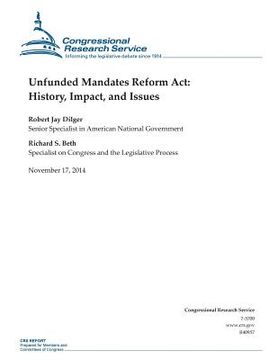Reseña del libro "Unfunded Mandates Reform Act: History, Impact, and Issues (en Inglés)"
The Unfunded Mandates Reform Act of 1995 (UMRA) culminated years of effort by state and local government officials and business interests to control, if not eliminate, the imposition of unfunded intergovernmental and private-sector federal mandates. Advocates argued the statute was needed to forestall federal legislation and regulations that imposed obligations on state and local governments or businesses that resulted in higher costs and inefficiencies. Opponents argued that federal mandates may be necessary to achieve national objectives in areas where voluntary action by state and local governments and business failed to achieve desired results. UMRA provides a framework for the Congressional Budget Office (CBO) to estimate the direct costs of mandates in legislative proposals to state and local governments and to the private sector, and for issuing agencies to estimate the direct costs of mandates in proposed regulations to regulated entities. Aside from these informational requirements, UMRA controls the imposition of mandates only through a procedural mechanism allowing Congress to decline to consider unfunded intergovernmental mandates in proposed legislation if they are estimated to cost more than specified threshold amounts. UMRA applies to any provision in legislation, statute, or regulation that would impose an enforceable duty upon state and local governments or the private sector. It does not apply to conditions of federal assistance; duties stemming from participation in voluntary federal programs; rules issued by independent regulatory agencies; rules issued without a general notice of proposed rulemaking; and rules and legislative provisions that cover individual constitutional rights, discrimination, emergency assistance, grant accounting and auditing procedures, national security, treaty obligations, and certain elements of Social Security. State and local government officials argue that UMRA has restrained the growth of unfunded federal mandates, but that its coverage should be broadened, with special consideration given to including conditions of federal financial assistance. During the 112th Congress, H.R. 4078, the Red Tape Reduction and Small Business Job Creation Act: Title IV, the Unfunded Mandates Information and Transparency Act of 2012, passed by the House on July 26, 2012, would have, among other changes, broadened UMRA's coverage to include both direct and indirect costs, such as foregone profits and costs passed onto consumers, and, when requested by the chair or ranking Member of a committee, the prospective costs of legislation that would change conditions of federal financial assistance. The bill also would have made private-sector mandates subject to a substantive point of order and removed UMRA's exemption for rules issued by most independent agencies. These UMRA provisions were reintroduced during the 113th Congress as H.R. 899, the Unfunded Mandates Information and Transparency Act of 2014, which was passed by the House on February 28, 2014, and included in H.R. 4, the Jobs for America Act [of 2014], which was passed by the House on September 18, 2014. This report examines debates over what constitutes an unfunded federal mandate and UMRA's implementation. It focuses on UMRA's requirement that CBO issue written cost estimate statements for federal mandates in legislation, its procedures for raising points of order in the House and Senate concerning unfunded federal mandates in legislation, and its requirement that federal agencies prepare written cost estimate statements for federal mandates in rules. It also assesses UMRA's impact on federal mandates and arguments concerning UMRA's future, focusing on UMRA's definitions, exclusions, and exceptions that currently exempt many federal actions with potentially significant financial impacts on nonfederal entities.

